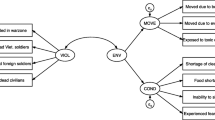Abstract
Criterion symptoms of posttraumatic stress disorder (PTSD) were measured 6–12 months after Hurricane Andrew in the United States (non-Hispanic n = 270), Hurricane Paulina in Mexico (n = 200), and the 1997 flood in Poland (n = 285), using English, Spanish, and Polish versions of the Revised Civilian Mississippi Scale. The samples ranged in age from 18 to 88. Linear and quadratic effects of age were tested by using hierarchical multiple regression, with the effects of gender, trauma, and education controlled. Among Americans, age had a curvilinear relation with PTSD such that middle-aged respondents were most distressed. Among Mexicans, age had a linear and negative relation with PTSD such that younger people were most distressed. Among Poles, age had a linear and positive relation with PTSD such that older people were most distressed. Thus, there was no one consistent effect of age; rather, it depended upon the social, economic, cultural, and historical context of the disaster-stricken setting.
Similar content being viewed by others
REFERENCES
Aiken, L., and West, S. (1991). Multiple Regression: Testing and Interpreting Interactions, Sage, Newbury Park, CA.
American Psychiatric Association (1994). Diagnostic and Statistical Manual of Mental Disorders, 4th edn., American Psychiatric Association, Washington, DC.
Bell, B., Kara, G., and Batterson, C. (1978). Service utilization and adjustment patterns of elderly tornado victims in an American disaster. Mass Emerg. 3: 71–81.
Bolin, R., and Klenow, D. (1983). Response of the elderly to disaster: An age-stratified analysis. Int. J. Aging Hum. Dev. 16: 283–296.
Bolin, R., and Klenow, D. (1988). Older people in disaster: A comparison of black and white victims. Int. J. Aging Hum. Dev. 26(1): 29–43.
Brislin, R., Lonner, W., and Thorndike, R. (1973). Cross-Cultural Research Methods, Wiley, New York.
Bromet, E., and Schulberg, H. (1986). The Three Mile Island disaster: A search for high risk groups. In Shore, J. H. (ed.), Disaster Stress Studies: New Methods and Findings, American Psychiatric Press, Washington DC, pp. 1–19.
Czapiñski, J. (1992). Psychologia szcześcia, Akademos, Poznañ, Poland.
Czapiñski, J. (1994). Uziemnienie polskiej duszy. Kultura i Spolłeczeñstwo 37(3): 18–37.
Czapiñski, J., and Panek, T. (eds.) (2000). Diagnoza spolłeczna 2000: Raport z badañsondażowych, Polskie Towarzystwo Statystyczne, Warszawa, Poland.
Doliñski, D. (1996). The mystery of the Polish soul. B. W. Johnson's effect àrebours. Eur. J. Soc. Psychol. 26: 1001–1005.
Falk, B., Hersen, M., and Van Hasselt, V. (1994). Assessment of post-traumatic stress disorder in older adults: A critical review. Clin. Psychol. Rev. 14(5): 383–415.
Gleser, G. C., Green, B. L., and Winget, C. (1981). Prolonged Psychosocial Effects of Disaster: A Study of Buffalo Creek, Academic Press, New York.
Goenjian, A. K., Najarian, L. M., Pynoos, R. S., Steinberg, A. M., Manoukian, G., Tavosian, A., and Fairbanks, L. A. (1994). Posttraumatic stress disorder in elderly and younger adults after the 1988 earthquake in Armenia. Am. J. Psychiatry 151(6): 895–901.
Gonzalez de la Rocha, M. (1988). Los recursos de la probreza: Familias de bajos ingresos de Guadalajara, CIESAS/El Colegio de Jalisco, Guadalajara, Jalisco, Mexico.
Green, B. (1996). Cross-national and ethnocultural issues in disaster research. In Marsella, A., Friedman, M., Gerrity, E., and Scurfield, R. (eds.), Ethnocultural Aspects of Posttraumatic Stress Disorder: Issues, Research, and Clinical Applications, American Psychiatric Association, Washington, DC, pp. 341–362.
Green, B., Lindy, J., Grace, M., Gleser, G., Leonard, A., Korol, M., and Winget, C. (1990). Buffalo Creek survivors in the second decade. Am. J. Orthopsychiatry 60: 43–54.
Huerta, F., and Horton, R. (1978). Coping behavior of elderly flood victims. Gerontologist 18: 541–546.
Kaniasty, K., and Norris, F. (1995). In search of altruistic community: Patterns of social support mobilization following Hurricane Hugo. Am. J. Community Psychol. 23: 447–477.
Kato, H., Asukai, N., Miyake, Y., Minakawa, K., and Nishiyama, A. (1996). Post-traumatic symptoms among younger and elderly evacuees in the early stages following the 1995 Hanshin-Awaji earthquake in Japan. Acta Psychiatr. Scand. 93: 477–481.
Kessler, R. (1982). A disaggregation of the relationship between socioeconomic status and psychological distress. Am. Sociol. Rev. 47: 752–764. Age Differences in Cultural Context 173
Kilijanek, T., and Drabek, T. (1979). Assessing long-term impacts of a natural disaster: A focus on the elderly. Gerontologist 19: 555–566.
Kleinman, A. (1988). Rethinking Psychiatry: From Cultural Category to Personal Experience, Free Press, New York.
Kuznets, S. (1976). Demographic aspects of the size and distribution of income: An exploratory essay. Econ. Dev. Cult. Change 25: 1–94.
Miller, J. A., Turner, J. G., and Kimball, E. (1981). Big Thompson flood victims. Fam. Relat. 30: 111–116.
Murphy, A., and Selby, H. (1985). Poverty and the domestic cycle in Oaxaca. Urban Anthropol. 14: 347–364.
Murphy, A., and Stepick, A. (1991). Social Inequality in Oaxaca: A History of Resistance and Change, Temple University Press, Philadelphia.
Norris, F., Foster, J., and Weisshaar, D. (in press). The epidemiology of sex differences in PTSD across developmental, societal, and research contexts. In Kimerling, R., Ouimette, P., and Wolfe, J. (eds.), Gender and PTSD.
Norris, F., and Murrell, S. (1988). Prior experience as a moderator of disaster impact on anxiety symptoms in older adults. Am. J. Community Psychol. 16: 665–683.
Norris, F., and Perilla, J. (1996). The Revised Civilian Mississippi Scale for PTSD: Reliability, validity, and cross-language stability. J. Trauma. Stress 9: 285–298.
Norris, F., Perilla, J., Ibanez, G., and Murphy, A. (2001). Sex differences in symptoms of PTSD: Does culture play a role? J. Trauma. Stress 14: 7–28.
Norris, F., Perilla, J., and Murphy, A. (2001). Post-disaster stress in the U.S. and Mexico: A cross-cultural test of the multi-criterion conceptual model of PTSD. J. Abnorm. Psychol. 100: 553–563.
Ollendick, D., and Hoffman, M. (1982). Assessment of psychological reactions in disaster victims. J. Community Psychol. 10: 157–167.
Ortega, A., and Rosenheck, R. (2000). Posttraumatic stress disorder among Hispanic Vietnam veterans. Am. J. Psychiatry 157: 615–619.
Phifer, J. (1990). Psychological distress and somatic symptoms after natural disaster: Differential vulnerability among older adults. Psychol. Aging 5: 412–420.
Price, J. (1978). Some age-related effects of the 1974 Brisbane Floods. Aust. N. Z. J. Psychiatry 12: 55–58.
Shore, J., Tatum, E., and Vollmer, W. (1986). Psychiatric reactions to disaster: The Mount St. Helens experience. Am. J. Psychiatry 143: 590–595.
Thompson, M., Norris, F., and Hanacek, B. (1993). Age differences in the psychological consequences of hurricane Hugo. Psychol. Aging 8(4): 606–616.
Ticehurst, S., Webster, R. A., Carr, V. J., and Lewin, T. J. (1996). The psychosocial impact of an earthquake on the elderly. Int. J. Geriatr. Psychiatry 11: 943–951.
Wang, X., Gao, L., Shinfuku, N., Zhang, H., Zhao, C., and Shen, Y. (2000). Longitudinal study of earthquake-related PTSD in a randomly selected community sample in North China. Am. J. Psychiatry 157(8): 1260–1266.
Wierzbicka, A. (1994). Emotion, language, and cultural scripts. In Kitayama, S., and Markus, H. (eds.), Emotion and Culture: Empirical Studies of Mutual Influence, American Psychological Association, Washington, DC, pp. 133–196.
World Health Organization (1993). The Composite International Diagnostic Inventory, World Health Organization, Geneva.
Author information
Authors and Affiliations
Rights and permissions
About this article
Cite this article
Norris, F.H., Kaniasty, K., Conrad, M.L. et al. Placing Age Differences in Cultural Context: A Comparison of the Effects of Age on PTSD After Disasters in the United States, Mexico, and Poland. Journal of Clinical Geropsychology 8, 153–173 (2002). https://doi.org/10.1023/A:1015940126474
Issue Date:
DOI: https://doi.org/10.1023/A:1015940126474




